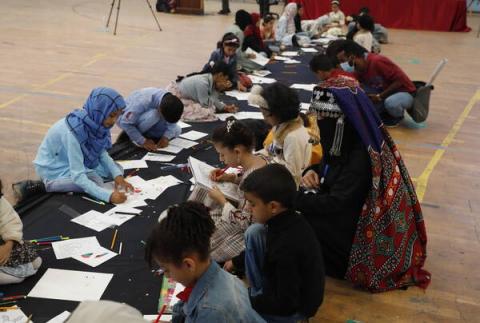Yemen: UNHCR Operational Update, covering the period 1 - 10 February 2022


IDP Response
UNHCR field staff are observing an increase in the number of families resorting to harmful coping mechanisms to make ends meet. As the prices of basic goods and cooking gas continue to rise due to the devaluation of the Yemeni Riyal in the south and the fuel shortage in the north, UNHCR field staff are registering an increasing number of families resorting to begging for food and assistance. Only this week, ten children were reported to either beg or be engaged in child labour in Sana’a governorate. UNHCR is addressing the most urgent needs of vulnerable families through the distribution of multipurpose cash assistance, provision of psychosocial support and referral to specialized services when required, among other interventions.
Threats of eviction remain a major risk for vulnerable and conflict-affected families in Yemen. During the reporting period, UNHCR identified 62 families having received threats of eviction in Amran alone, out of which 12 were on the brink of being evicted. UNHCR referred the identified families for legal support and rental subsidies. In 2021, UNHCR distributed USD 20M in rental subsidies benefitting close to 80,000 families (some 480,000 individuals) UNHCR field offices in Sa’ada, Ibb and Hudaydah have reported that partners face challenges in conducting their daily activities due to the ongoing fuel shortage and rise in prices. Activities in remote areas have been particularly affected, since partners are unable to secure fuel to reach those areas. In addition, some partner staff have faced difficulties accessing their offices and community centres due to the lack of public transportation or high fuel prices.
Refugee Response
During the reporting period, UNHCR-supported clinics and healthcare services assisted over 1,500 refugees, asylum-seekers and members of the host community in Aden governorate. UNHCR-supported clinics carried out consultations and addressed specific cases, mainly related to upper respiratory infections and febrile illnesses.
UNHCR is continuing its distribution of winter cash assistance for refugees and asylum-seekers. The disbursements started on 25 January targeting some 7,000 refugee families. The assistance aims to support vulnerable refugee and asylum- seeking families living at a certain attitude to cope with their winter needs and additional expenditures. So far close to 90% of the beneficiary families have received their installments. UNHCR has further ensured the activity of three mobile teams to guarantee that persons with reduced mobility are duly reached.

Aden — Yemen Airways has announced new updates to its ticket cancellation (VOID) policy, introducing financial penalties on travel agents in…

Geneva – The United States announced that Yemen will not be among the countries benefiting from a new $2 billion funding pledge for United Na…

Paris — The French humanitarian organization Acted announced that it has delivered cash assistance to nearly 89,000 people affected by displa…